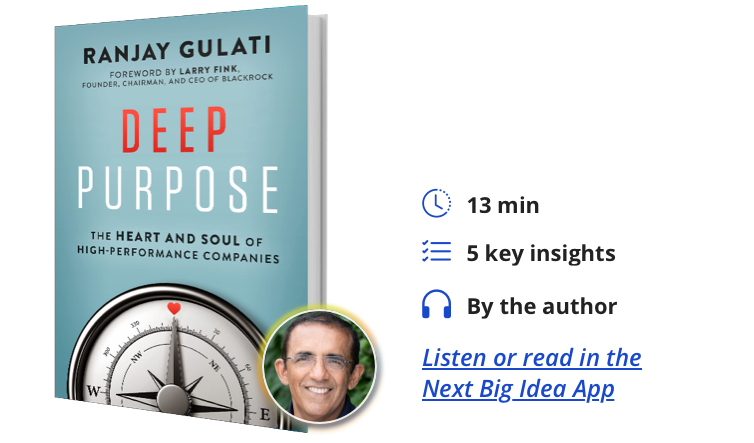Ranjay Gulati is a professor of business administration at Harvard Business School. His research focus consists of leadership, strategy, and organizational issues in high-growth firms. His latest book explores how all of us can use the power of purpose to unlock hidden potential in ourselves and our companies.
Below, Ranjay shares 5 key insights from his new book, Deep Purpose: The Heart and Soul of High-Performance Companies. Listen to the audio version—read by Ranjay himself—in the Next Big Idea App.

1. Purpose is more than words.
I first became intrigued by the notion that a company could aspire to something higher—a purpose—while watching my mother as a child. She ran a startup that produced traditional Indian fashions for sale in Western markets. Animating her tireless efforts was a strong sense of purpose: she wanted to provide jobs to impoverished Indian villagers and show the world that they weren’t primitives to be pitied, but rather artistic creators to be admired. My mother’s higher ambitions focused her and fired her up to succeed, keeping her on track during tough times. Purpose informed everything her company did.
By some accounts, over 90 percent of companies list a purpose statement on their website. Almost always, these statements are vacuous. Some leaders utter them because they feel they have to—they’re checking a box. Others use them as a cloak of virtue to mask bad behavior.
Leaders at extraordinary firms treat purpose as more than words. In their hands, it’s a true fount of meaning for the organization. Evoking a vision of the future that both includes and transcends economic success, purpose inspires strategies, influences decisions, and animates relationships with customers, employees, and other stakeholders. It serves as a compass for your direction and governing principles. It’s also an operating system that helps build trusting relationships. Ultimately, purpose is an energizing force, propelling businesses toward extraordinary success and outsized impact.
2. Work can be more than a job.
When it comes to work, meaning is critically important. Research has shown that many employees value meaning and purpose just as much as a great paycheck. We talk a lot about the Great Resignation, but it’s actually a Great Rethink. Yes, many employees leave in search of better pay, benefits, or more flexibility. But some also seek out companies that are making a difference in the world. They want their efforts to matter.
“We continue to focus primarily on compensation despite decades of research showing that employees also value meaningful work.”
Leaders at KPMG accounting firm asked employees: “Why do you come to work?” Employees wrote their answers on index cards and posted them in their offices. It was obvious that they perceived their jobs as a means of supporting their families, but just about all of them also linked their jobs to a greater good. Depending on the client whom they were supporting, they were helping fight crime, protect the country, strengthen businesses, and so on. Higher ambitions gave them pride and fulfillment, as well as a sense of emotional connection to the organization.
During my research at Microsoft, Chief People Officer Kathleen Hogan remarked to me, “You won’t truly work for Microsoft until Microsoft works for you.” Hogan was embracing the idea that organizations must find a way to connect corporate purpose to employees’ personal purposes. Microsoft explicitly encourages employees to use the company as a platform for pursuing their own life-passions. In the process, employees take pride in the organization’s purpose of empowering “every person and every organization on the planet to achieve more.”
We’ve designed our organizations on the premise that employees only care about money: Pay them well, and they’ll perform. We continue to focus primarily on compensation despite decades of research showing that employees also value meaningful work. In the years ahead, companies that allow employees to connect their life purpose with the organizational purpose will enjoy an important advantage in attracting and retaining top talent. If you’re a leader, take note. And if you’re an employee, don’t settle—seek out opportunities at deep purpose companies.
3. Is purpose a distraction?
Skeptics contend that purpose is bad for business. By forcing leaders to think beyond narrow economic success, it effectively serves as a tax on business. Are they right? Or should we believe recent research suggesting that the pursuit of purpose enables growth, profit, and innovation?
“Employees who see work as a highly personal calling feel energized to put out their very best.”
Delving into the workings of deep purpose firms, I found that purpose catalyzes business success in a host of ways.
First, purpose is directional. In turbulent times, it serves as a North Star, helping leaders forge crisper strategies and channel innovation.
Second, purpose is reputational. It allows companies to build trust and loyalty with customers who admire organizations’ public commitments to their ideals.
Third, purpose is relational. When companies adopt purpose as an operating system, they build credibility, trust, and enduring relationships with strategic partners and suppliers.
Finally, purpose is motivational. Employees who see work as a highly personal calling feel energized to put out their very best. When companies elevate work, employees aren’t just “satisfied” or “engaged”—they’re inspired.
4. Take a walk on the razor’s edge.
By definition, purpose forces you to think long term toward a vision of an idealized future. In pursuing this vision, deep purpose leaders commit to serving a range of stakeholders—not just investors, but also employees, communities, the planet, and so on. Since stakeholders’ interests often conflict in the short run, these leaders find themselves navigating painful tradeoffs.
Critically, these leaders tend not to shrink from tradeoffs but lean into them. Instead of meandering between seemingly opposing goals, they learn to prioritize them so that, over time, they come into harmony. With purpose as their guide, these leaders make decisions with an eye toward delivering benefit for everyone over the long term, even if in the short term, some stakeholders lose out. These leaders turn to purpose to communicate their choices, rallying stakeholders to sacrifice temporarily on behalf of the greater cause. In rare cases, deep purpose leaders can also craft “win-win” solutions in which all stakeholders come out ahead in both the short and long term.
“With purpose as their guide, these leaders make decisions with an eye toward delivering benefit for everyone over the long term, even if in the short term, some stakeholders lose out.”
Imperfect but necessary tradeoffs can take many forms. Some big firms invest in socially beneficial projects, realizing that profits might not materialize for a number of years. Investors temporarily lost out while customers or communities benefit. On the other hand, some social ventures made decisions that temporarily hurt employees or the environment. One green agriculture company that was revolutionizing food production reluctantly used plastic packaging because none of the alternatives were practicable. An online retailer had to lay off employees to thrive financially and pursue social objectives. In both cases, these short-term sacrifices hurt, but everyone won in the end because of a disciplined commitment to the purpose.
5. Leaders must be poets, not just plumbers.
As leaders, we tend to concentrate on tackling strategic and financial challenges—the plumbing of business. But it’s also vital to attend to meaning and emotion—the poetry of business. Instilling purpose deeply—making employees really feel it in their bones—is all about poetry. We can evoke purpose by telling grand narratives about the company and the transformative effect it seeks to have on the world. We can evoke the moral values that set companies apart, as well as the challenges employees must surmount to realize those values in the world.
We can also serve as poets by sharing stories that convey purpose’s meaning to us. Emanuel Faber, Danone’s former CEO (renowned for his purpose-driven leadership), inspired stakeholders by describing how caring for his mentally ill brother changed his perspective on business, leading him to strengthen purpose in his organization. Panera Bread CEO Niren Chaudhary has described how his experiences watching his daughter find meaning while grappling with a terminal illness fed his own intense commitment to purpose. Deep purpose leaders don’t just manage organizations—they elevate them, transforming them into moral communities bound by an abiding commitment to purpose and values.
Great ideas have power, but only grand ideals can capture our imaginations and motivate us to the fullest. My hope is that leaders will pursue purpose more fervently, and that employees will seek out deep purpose organizations as desirable places to work.
To listen to the audio version read by author Ranjay Gulati, download the Next Big Idea App today:































